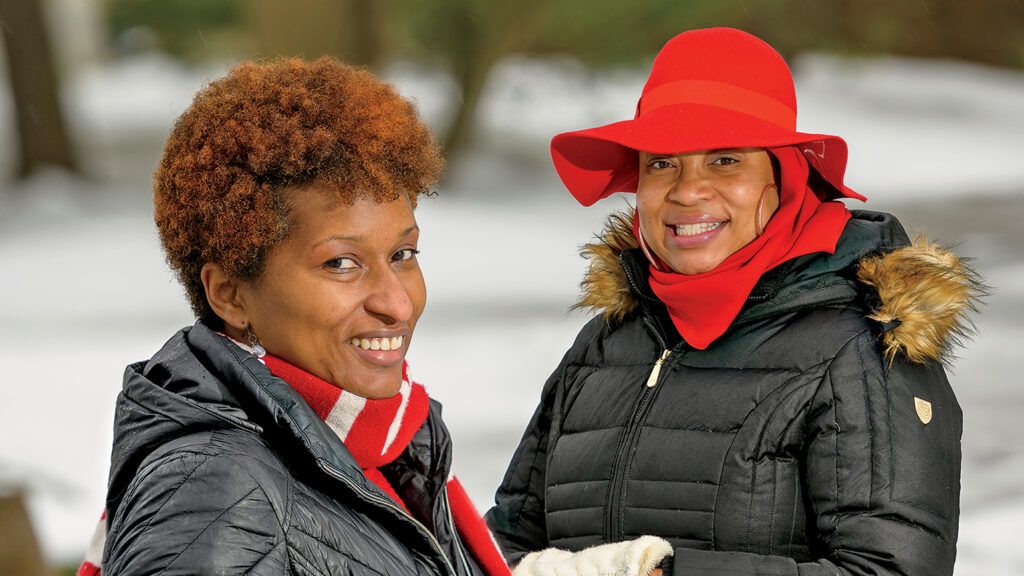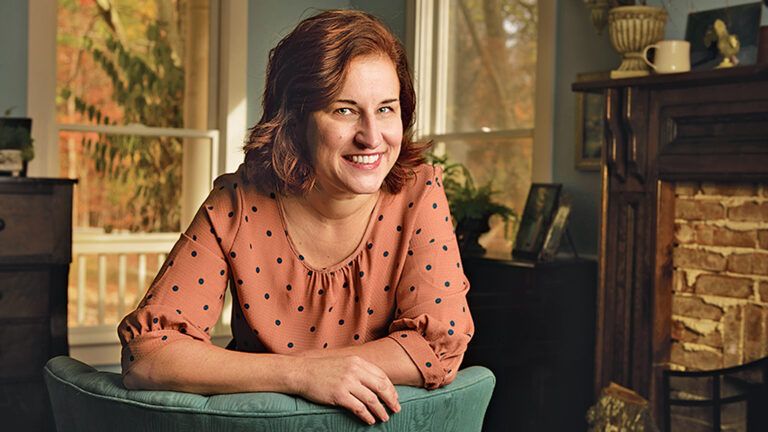I hung up the phone, wondering what I’d gotten myself into.
I had been talking to the president of the local alumnae chapter of my sorority, Delta Sigma Theta. I’d been an active Delta in college and for a few years afterward, but I’d become less involved after marrying and having kids. Now that my career was established and my kids were older, I’d re-engaged as an alumnae member. I planned to join the social action committee of the chapter where I lived in south New Jersey.
Delta Sigma Theta Sorority, Inc., was founded in 1913 at Howard University, in Washington, D.C. The sorority was based on the Christian principles of public service but is open to women of all faiths. My local chapter focused on community service activities such as feeding the homeless, mentoring young people, registering people to vote and supporting educational and social justice initiatives.
I was thrilled when the chapter president welcomed me onto the committee and, after two years of service, offered me a position on the leadership team.
Then the chapter president revealed who my co-leader would be: “You’ll be working with Ma’isha.”
She meant Ma’isha Aziz, a lawyer and a judge who had joined Delta Sigma Theta at a different university. We would co-lead the social action committee: Ma’isha as chairperson and me as co-chair. I felt myself mentally take a step back. I wasn’t quite prepared for this news.
Ma’isha was…a force. I didn’t know her well, but I had heard her speak at monthly chapter meetings. She was no-nonsense, opinionated and direct. The opposite of my personality.
Our personality differences weren’t the only source of my apprehension.
Ma’isha was a Muslim.
I did not think of myself as someone who was prejudiced against people because of their faith. Several years earlier, I had developed a lesson for our church’s children’s ministry about world religions. I had been disturbed by the rise of anti-Muslim discrimination after the September 11 terrorist attacks. As an African-American woman, I knew how wrong it was to make generalizations about an entire group of people.
Still, I’d never been close friends with anyone who was Muslim. I grew up attending a Christian school, and most of my childhood friends were from my family’s church. Church remained an important part of my life, and my social circle was mostly Christian.
Was I reacting to this news about Ma’isha because of her faith?
I hoped it was just the personality differences. I was more of a quiet observer, the kind of person who hangs back in new situations and speaks up in meetings only when I feel strongly about something. I was more laid-back, generally. Ma’isha was rather formal. Would I get steamrollered working with her?
What if I voiced a disagreement and she interpreted my comment as being critical of her faith? Could I speak openly about my own? Church was so important to me.
I tried to keep an open mind and a positive attitude. Maybe I was overreacting about Ma’isha. Still, I was a little surprised at myself.
A few days later, we talked on the phone. I had prepared some ideas, but Ma’isha started right in with her own plans.
“I was chair of this committee 10 years ago, and we had great success with voter registration, so we’ll start again with that,” she told me. “How about we set up a table at high school football games and other community events? We can work out the details at our first meeting.”
I offered a few of my ideas.
“We can talk about all of that with the rest of the committee,” Ma’isha said. “I look forward to working with you, Soror Avent.” Soror, Latin for “sister,” is what sorority members call each other. She ran the rest of the conversation, and we agreed on a date for the first meeting.
Even before the pandemic, our committee conducted business via conference phone calls. I kept quiet and took notes during the first meeting as Ma’isha went through the agenda with her usual command. She informed everyone she expected them to become familiar with voter registration applications and sign up for an event.
Her tone indicated this was not optional. A few women offered other ideas, but Ma’isha stayed focused on her priorities. Her training as a lawyer made her a formidable debater.
Will every meeting be like this? I wondered. Usually I can find some point of connection with people, even folks I’m not all that comfortable with.
Ma’isha truly was a force. And the faith difference made it hard for me to relax and make small talk. I often end up talking about my faith with people I know. I didn’t want to be too forward on that topic until Ma’isha and I were better acquainted.
A few weeks later, she and I were scheduled to deliver a report to the chapter, which met once a month in person on Saturday mornings. I pulled into the parking lot, unsure what to expect. Here we go, I thought.
A text message from Ma’isha appeared on my phone. “I saved you a seat.” Well, that was nice! Inside, the room was packed. Ma’isha wore a hijab when she appeared in public. I scanned the rows and saw her bright red head covering beside an empty seat. I happily responded to her overture.
“Good morning!” I said. “Thanks for saving me a seat.”
She smiled and asked if I had any final thoughts about our report. We made a few changes, then gave our presentation. As usual, Ma’isha dominated the discussion, but the next time we talked on the phone, she didn’t start with business.
“How’s your family?” she asked. I told her my girls’ latest news, and she talked about her son, Mansa, who was starting college. I wondered how her parenting style compared to mine.
Gradually our relationship grew easier. Working together at voter registration tables and talking each week on the phone, we learned about each other’s lives and figured out how to work productively. One topic we did not discuss: religion. Ma’isha’s devotion to her faith was obvious. She sometimes had to cut meetings or phone calls short to pray.
I wanted to ask why her prayer schedule was so strict, but I didn’t feel comfortable raising the issue. Nor did I feel comfortable sharing details about my church. What if she took it the wrong way?
One day, Ma’isha began our weekly phone conversation with a question. “Would Kennedi like to join the NAACP youth council?”
She meant my 14-year-old daughter, Kennedi, joining the local NAACP chapter’s youth council, where Ma’isha volunteered as an adviser.
“Maybe she would,” I said. “Tell me more about it.”
“We do community service projects, go on college tours and provide leadership opportunities for the kids,” Ma’isha said. “Kennedi would like it.”
“I’ll ask her,” I said. I found it hard to imagine Ma’isha connecting with teens. But the group sounded like a great opportunity for Kennedi, who would be filling out college applications in just a few years.
I drove Kennedi to the next meeting, which was at a Masonic lodge in a nearby town, and found a seat in back to watch. There were about 50 kids.
Ma’isha strode in. “All right, everybody, settle down. We have a full agenda today.”
She was the same Ma’isha, all business. She addressed the kids by their last names: “Miss Avent.” “Mr. Jones.” I could tell those kids looked up to her. And she came up with interesting activities. Soon the room was buzzing with talk about an opportunity to volunteer at an organization that supported homeless people.
I no longer had to imagine what Ma’isha was like as a mom. In many ways, she was like me. She had high expectations for her kids and a passion for community service and raising up the next generation. We had a lot in common.
The following spring, Ma’isha gave me a heads-up that Ramadan was approaching. I had read about Ramadan for my children’s ministry lesson about world religions, but I didn’t remember much. Ma’isha said she’d be fasting and praying from sunrise to sunset for a month and we’d have to work around that.
I decided now was the time to ask about her faith. Summoning my courage, I said, “I know a little about Ramadan but not much. Can you explain it to me?”
I braced for her to take offense. Instead, a smile lit her face and she said, “I’m so glad you asked.” She told me that Ramadan is the holiest time in the Muslim calendar, a period of fasting and prayer that lasts from one crescent moon in the lunar cycle to the next. Families gather in the evening for iftar, a meal breaking the fast. At the end of Ramadan comes the festive holiday of Eid al-Fitr.
“Fascinating,” I said. “That sounds tough. Just let me know how I can help out with the committee while you’re fasting.” My question about Ramadan seemed to have opened a door. A couple weeks later, when I missed a call from Ma’isha on Sunday, while I was in church, she asked a question about my faith: “What was the word about today?”
Really? She wanted to know about the sermon at my church?
“Forgiveness,” I said.
“Mmm,” said Ma’isha. “Interesting. Tell me more.”
We had a long conversation about our faiths. I came away from it feeling that, while our religions might be different, our commitment to faith was equally strong.
When my smartphone calendar informed me that another Muslim holiday was approaching, I asked Ma’isha, “What kind of greeting should I offer you during this time?”
“I so appreciate that question,” she said. “You can say, ‘Eid Mubarak.’ It means, ‘Have a blessed celebration.’”
The pandemic hit, and our chapter meetings were forced to shift online. I missed seeing Ma’isha in person.
In April 2020, my 47-year-old brother died of Covid.
Ma’isha was stricken when I gave her the news. “I’ll be praying for you,” she told me.
“I appreciate that,” I said quietly into the phone.
It comforted me to think that Ma’isha wanted to lift up my brother and my family to God. She truly was Soror Aziz. My sister.
Ma’isha and I remain friends and co-chairs of the sorority service committee. Ma’isha jokes that I’ve made her soft as a leader. I’m glad she’s so on top of everything.
I’m especially glad we opened up to each other about what matters most in our lives. I admit I was intimidated by the prospect of working with someone of a different faith. I mistakenly attached certain personality traits to how Ma’isha worshipped. In fact, I know plenty of Christians who are formal and assertive. It has little to do with what they believe.
Faith turned out to be something that has drawn Ma’isha and me together. Both women of deep belief, we worship differently and have different ideas about God. But our values are the same: faith, family, community.
I think of the small gestures that gradually drew us closer: “I saved you a seat.” “What’s Ramadan?” “Can I pray for you?”
I thank God for opening our hearts and guiding each of us to our common ground.
For more inspiring stories, subscribe to Guideposts magazine.





